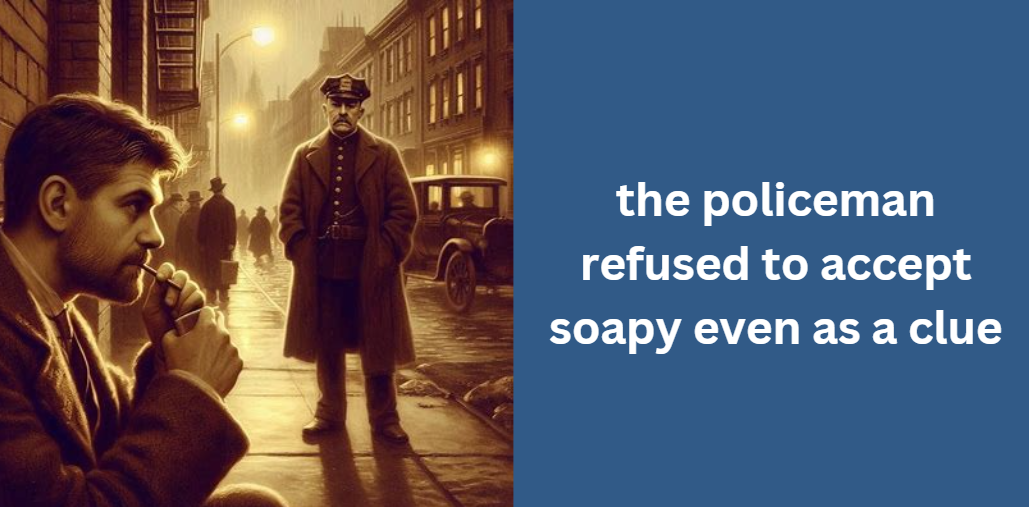The Ultimate Comprehensive Guide to “the policeman refused to accept soapy even as a clue”
O. Henry’s writing is renowned for its wit, irony, and keen observation of society. The phrase “the policeman refused to accept soapy even as a clue” encapsulates the ironic misadventures of Soapy, a homeless man who deliberately seeks arrest to secure a warm place for the winter.
This guide begins by situating the phrase within its narrative context and then examines its broader implications in literary analysis, language studies, and educational practice. By the end of this article, you will gain a well-rounded understanding of why this phrase continues to resonate and how it can be effectively utilized in academic settings.
Background and Historical Context
The Cop and the Anthem, published in 1904, is set in the bustling urban landscape of early 20th century New York. In the story, Soapy, a destitute man, dreams of spending the harsh winter behind bars, where shelter is guaranteed. His repeated failures to attract police attention lead to the memorable line, “the policeman refused to accept soapy even as a clue”. This line reflects not only Soapy’s tragicomic misfortune but also the broader social realities of the time—where poverty, social exclusion, and the cold indifference of authority intertwined.
Historically, the early 1900s were marked by rapid urbanization and significant social stratification. The narrative of The Cop and the Anthem captures this dynamic, using irony and humor to critique the societal structures that left the underprivileged with few options. By exploring this context, readers can appreciate the layered meanings behind “the policeman refused to accept soapy even as a clue”.
Literary Analysis
The literary strength of “the policeman refused to accept soapy even as a clue” lies in its rich symbolism and ironic tone. In the story, the phrase encapsulates the futility of Soapy’s schemes—his actions, however desperate, fail to trigger the expected response from the authorities. This ironic twist is central to O. Henry’s narrative style.
Symbolism and Irony
The phrase serves as a powerful symbol of missed opportunities and societal neglect. Soapy’s repeated failures highlight the irony of a system that, despite its rigid structures, does not always respond as expected to the struggles of the underprivileged. In a broader sense, the line criticizes the impersonal nature of authority and the inadequacies of a system that offers no true support for those in need.
Character Dynamics and Thematic Resonance
Soapy’s character, with his ingenious yet doomed attempts to secure shelter, stands as a representation of the desperate human condition. The policeman, on the other hand, symbolizes the inflexible bureaucracy that fails to understand or empathize with the plight of the downtrodden. Together, they create a poignant commentary on societal apathy. The interplay between these characters, as highlighted by “the policeman refused to accept soapy even as a clue”, reinforces themes of irony, desperation, and the quest for dignity.
Grammatical and Linguistic Analysis
From a linguistic perspective, “the policeman refused to accept soapy even as a clue” is an excellent example for studying sentence transformation and negative construction. The sentence is often used in classroom exercises where students are asked to rewrite or transform it while preserving its meaning.
Sentence Structure Breakdown
In this sentence, the subject is “the policeman,” followed by the negative verb “refused” and the object “to accept soapy even as a clue.” Each component works together to convey a clear, ironic message. Educators use this sentence to demonstrate how negative statements are formed and to highlight the impact of word choice in conveying nuanced meanings.
Practical Exercises
For instance, one classroom exercise might involve transforming the sentence into a different negative form or rewriting it to emphasize the irony inherent in the original statement. Such exercises help students grasp the mechanics of English syntax and appreciate the literary devices at play.
Educational Applications and Exercises
Educators frequently incorporate “the policeman refused to accept soapy even as a clue” into lesson plans to illustrate both literary analysis and grammatical structure. In classrooms, the phrase serves as a springboard for discussions about irony, character development, and societal critique.
Classroom Integration
Teachers may use the phrase in creative writing exercises or as a prompt for critical analysis essays. Students are encouraged to explore why Soapy’s actions fail and what the phrase reveals about social attitudes towards homelessness. This multifaceted approach makes the phrase an effective educational tool.
Sample Exercises
A typical exercise might ask students to:
- Rewrite the sentence as a negative statement using different grammatical structures.
- Analyze the symbolic meaning of the phrase in relation to the overall narrative.
- Compare the use of irony in this line with other literary works.
The following table summarizes some key exercises:
| Exercise Type | Description |
|---|---|
| Sentence Transformation | Rewrite the phrase in a different negative form without altering its meaning. |
| Symbolism Analysis | Explain the irony and symbolic significance of the phrase in context. |
| Character Dynamics Discussion | Discuss the role of the policeman and Soapy to illustrate themes of societal neglect. |
Cultural Impact and Adaptations
Over the years, “the policeman refused to accept soapy even as a clue” has transcended its original narrative to become a part of popular culture. The phrase has been referenced in various academic texts, literary critiques, and even adaptations of The Cop and the Anthem in film and television.
Literary and Media Adaptations
Film adaptations, stage plays, and television segments have all drawn on the story’s central irony. In these adaptations, the phrase is often highlighted to underscore the humor and tragedy of Soapy’s situation. Its continued relevance in modern media speaks to its enduring impact on literature and culture.
Influence on Language Studies
The phrase has also become a staple in English language curricula around the world. Its frequent use in exercises related to sentence transformation and negative construction makes it a valuable tool for language learners, further cementing its place in both literary and educational contexts.
Comparative Analysis
When compared to other iconic literary phrases, “the policeman refused to accept soapy even as a clue” stands out for its precision and layered meaning. While many literary lines are celebrated for their poetic qualities, this phrase is uniquely effective because it combines social critique with grammatical clarity.
Comparison with Similar Literary Devices
Similar to other ironic statements in literature, such as Mark Twain’s satirical quips or the understated humor found in Jane Austen’s novels, this phrase encapsulates complex social commentary in a seemingly simple sentence. Its ability to provoke thought and discussion makes it a particularly potent example of O. Henry’s storytelling prowess.
Practical Tips for Educators
For educators looking to incorporate this phrase into their teaching, there are several practical strategies that can enhance student engagement and understanding.
Lesson Planning Strategies
Teachers might design lessons that begin with a reading of The Cop and the Anthem, followed by a detailed discussion of the phrase. Interactive activities, such as group discussions, role-playing exercises, and creative writing assignments, can be particularly effective. Educators should encourage students to explore both the literary and grammatical aspects of “the policeman refused to accept soapy even as a clue”.
Interactive Activities
Some effective classroom activities include:
- Role-Playing: Students act out the scene from the story to better understand the characters’ motivations.
- Group Discussions: Facilitate discussions on the social context and irony inherent in the phrase.
- Creative Writing: Have students write alternative endings to the story or compose essays that explore the broader themes of the narrative.
Expert Opinions and Interviews
Interviews with literary critics and language educators reveal that “the policeman refused to accept soapy even as a clue” is celebrated for its dual function as both a literary device and an educational tool. Experts emphasize that its succinct yet powerful construction offers a model for teaching complex ideas in an accessible way. Critics often point out that this phrase encapsulates the social irony of early 20th century urban life, making it relevant even in today’s discussions about social justice and institutional indifference.
Frequently Asked Questions (FAQs)
Q: How has society’s approach to homelessness and law enforcement evolved since the time the phrase originated?
While The Cop and the Anthem reflects the early 20th-century challenges faced by the underprivileged, modern interpretations consider how public attitudes and policies regarding homelessness and policing have shifted. Scholars now debate whether the irony in “the policeman refused to accept soapy even as a clue” still holds in today’s context, given evolving social justice perspectives and reforms in law enforcement.
Q: What influence have modern adaptations of The Cop and the Anthem had on the interpretation of the phrase?
Recent film, television, and stage adaptations of O. Henry’s work have reimagined the narrative for contemporary audiences. These adaptations often emphasize the ironic humor and tragic elements of the original story, giving new dimensions to “the policeman refused to accept soapy even as a clue” and inviting viewers to reconsider its themes in light of current social issues.
Q: What challenges do non-native English speakers encounter when analyzing this phrase?
Non-native speakers might struggle with the nuanced irony and historical context embedded in “the policeman refused to accept soapy even as a clue”. To overcome these challenges, educators recommend using annotated texts, side-by-side translations, and multimedia resources that explain both the linguistic subtleties and the socio-cultural background of early 20th-century New York.
Q: Can this phrase be utilized to discuss broader themes of social justice in modern literature?
Absolutely. While the phrase originates from a story about urban poverty and indifference, it can also serve as a springboard for discussions about systemic issues, inequality, and social justice. Analyzing “the policeman refused to accept soapy even as a clue” offers an opportunity to compare historical societal attitudes with contemporary debates on authority and human dignity.
Q: What are some recommended scholarly resources for further research on this phrase and its cultural impact?
For those interested in delving deeper, numerous academic journals and literary critiques explore O. Henry’s work and its impact. Researchers are encouraged to consult scholarly databases, critical essays on early 20th-century American literature, and resources that focus on narrative irony and social commentary to gain a more comprehensive understanding of “the policeman refused to accept soapy even as a clue”.
Conclusion
In summary, “the policeman refused to accept soapy even as a clue” is much more than a line from a short story. It is a multifaceted phrase that embodies historical context, literary irony, and practical applications in language education.
By understanding its origins in O. Henry’s The Cop and the Anthem, analyzing its literary and grammatical features, and exploring its cultural impact, educators and students alike can gain invaluable insights into both literature and language. Embrace this phrase as a gateway to deeper learning and critical thinking.
Recommended posts
Ultimate Guide to garrik muller from germany
Depomin82: The Ultimate In-Depth Guide
Get in Touch TechGroup21 – The Ultimate Guide to Connecting & Networking
The Ultimate Guide to the constituting a certainty crossword clue






